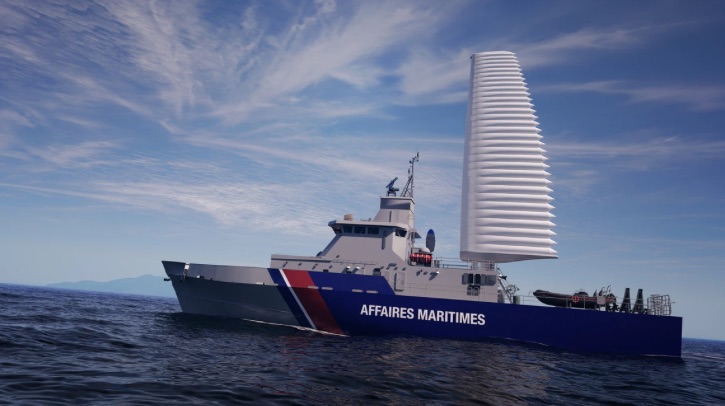The French General Directorate for Maritime Affairs, Fisheries and Aquaculture (DGAMPA) has placed the first order for Michelin’s WISAMO (Wing Sail Mobility) solution, which will be installed on a new deep-sea patrol vessel.
The WISAMO wingsail, with a surface area of 170m²/1,829ft², will provide additional wind-assisted propulsion to complement the hybrid diesel-electric system. A fuel consumption reduction of approximately 15% is expected through the optimization of the design and the vessel’s operational profile. These features have made it possible to meet the DGMPA’s expectations in terms of environmental performance without affecting the ship’s operations or limiting its intervention capabilities.
Efficient wind propulsion
The WISAMO system is based on three key components. First is a self-supporting telescopic mast that is fully retractable, meaning it can be deployed or stowed as needed. Second is a durable lightweight fabric envelope that is inflated at low pressure to form a symmetrical wingsail profile. Third is a fully automated control system that manages all sail functions (hoisting, lowering, adjusting, maneuvering, reefing and protective stowage according to environmental conditions), eliminating the need for additional crew workload.
Michelin highlights that its ease of use and fully retractable design make the WISAMO solution an all-rounder that can be adapted to numerous applications. WISAMO will be involved with the architectural firm and shipyard from the ship’s early design and development phases this year. It will also follow up on the onboard installation, scheduled for early 2027, until the full handover of the equipment. The Michelin teams will also be present for the sea trials, expected to take place at the end of that same year.
Integrating composite materials
 According to the company, the WISAMO wingsail shows a broad spectrum of uses for composite materials. Maude Portigliatti, business director of polymer composite solutions and member of Michelin group’s executive committee, commented, “Equipping a first ship is a significant step forward in the development of WISAMO, Michelin’s solution, which aims to support the decarbonization of the maritime sector. This contract not only validates the relevance of our technological choices and the robustness of our solution but also reinforces Michelin’s pioneering spirit.”
According to the company, the WISAMO wingsail shows a broad spectrum of uses for composite materials. Maude Portigliatti, business director of polymer composite solutions and member of Michelin group’s executive committee, commented, “Equipping a first ship is a significant step forward in the development of WISAMO, Michelin’s solution, which aims to support the decarbonization of the maritime sector. This contract not only validates the relevance of our technological choices and the robustness of our solution but also reinforces Michelin’s pioneering spirit.”
A French collaboration
This new patrol vessel project is the successor to the Iris, which was designed nearly 40 years ago. The new vessel is the result of a collaboration between three French companies: Mauric, the naval architecture firm responsible for the design; Socarenam, the shipyard in charge of construction; and Michelin, which will equip the vessel with the innovative WISAMO wind propulsion technology.
This new patrol vessel will be assigned maritime surveillance within the Exclusive Economic Zone (EEZ), monitoring vessels of all sizes and supporting the French government’s maritime operations. Beyond the surveillance and regulatory enforcement of fisheries, it will also ensure navigation monitoring, maritime pollution control, environmental law enforcement, and search-and-rescue operations. It will be based in La Rochelle and operate along the Atlantic coast, particularly in the Bay of Biscay. This is where the WISAMO was successfully tested, demonstrating the endurance of its system for several months in 2023 aboard the MN Pelican.
Michelin says it aims in the coming years to develop a broad range of wingsails to support the decarbonization of all types of ships, including sizeable vessels (large pleasure craft and work or cargo vessels, from 60ft to 60m).
In related news, Vela, a French company specializing in wind-powered maritime transportation, recently completed a funding round of €40m (US$43m) to build its first sailing cargo trimaran. Click here to read the full story.



